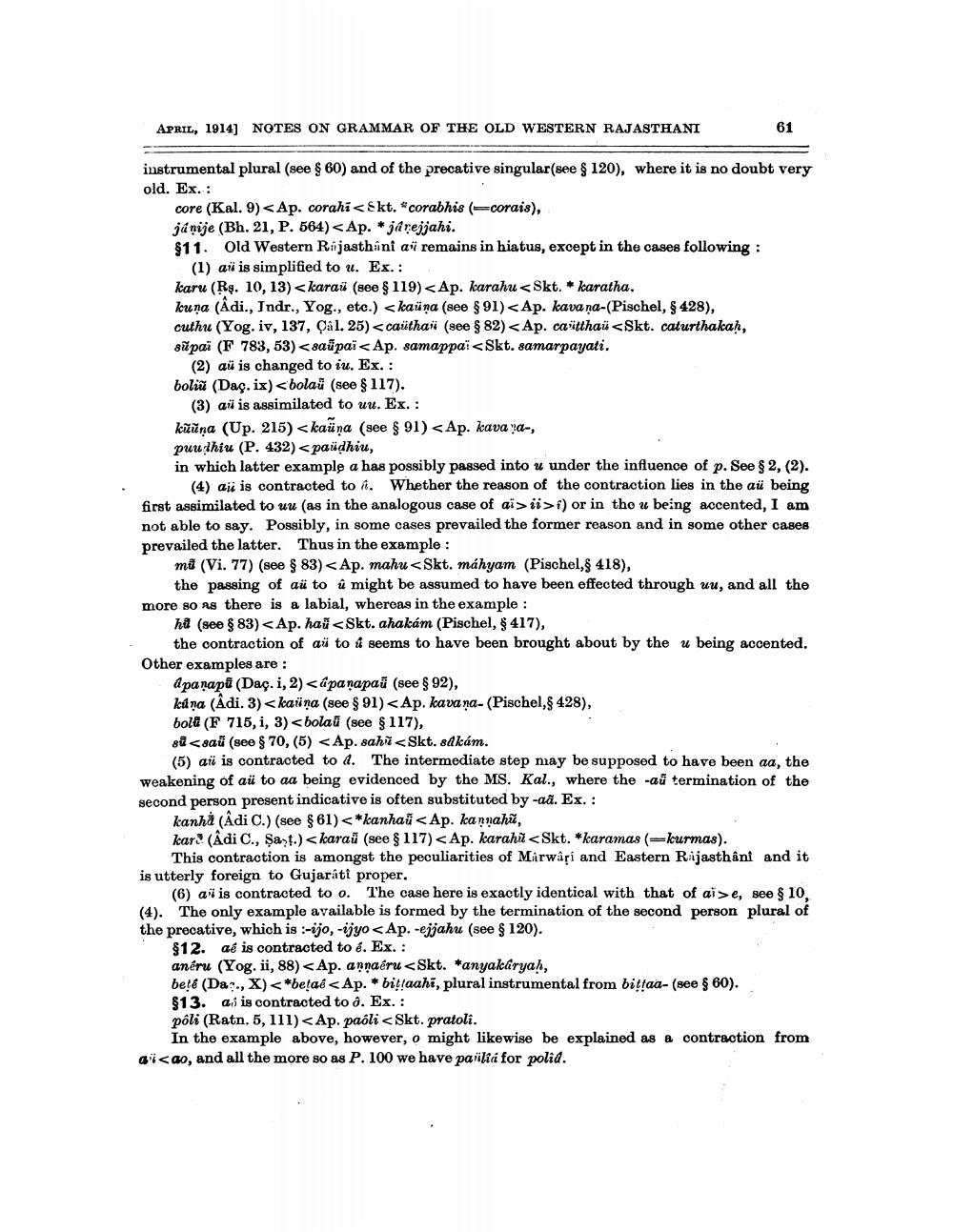________________
APRIL, 1914] NOTES ON GRAMMAR OF THE OLD WESTERN RAJASTHANI
61 - instrumental plural (see $ 60) and of the precative singular(see $ 120), where it is no doubt very old. Ex.:
core (Kal. 9) Ap. corahi < Ekt. *corabhis corais), já nije (Bh. 21, P. 564) <Ap. *jarejjahi. 811. Old Western Rijasthani aï remains in hiatus, except in the cases following:
(1) ai is simplified to u. Ex.: karu (Rş. 10, 13) <karai (see $ 119) Ap. karahu <Skt. * karatha. kuna (Adi., Indr., Yog., etc.) <kaina (see 891) <Ap. kava na-(Pischel, $ 428), cuthu (Yog. iv, 137, Çal. 25) < caüthax (see $ 82) <Ap. caütthaü <Skt. caturthakah, sipaž (F 783, 53) saupai < Ap. samappaisSkt. samarpayati.
(2) aü is changed to iu. Ex.: boliū (Daq, ix) <bolaŭ (see $ 117).
(3) ai is assimilated to uu. Ex.: kūūna (Up. 215) <kaina (see § 91) < Ap. kavana-, puudhiu (P. 432) <paüdhiu, in which latter example a has possibly passed into u under the influence of p. See 82, (2).
(4) ai is contracted to it. Whether the reason of the contraction lies in the aü being first assimilated to uu (as in the analogous case of aï> i>i) or in the u being accented, I am not able to say. Possibly, in some cases prevailed the former reason and in some other cases prevailed the latter. Thus in the example:
mu (Vi.77) (see $ 83)<Ap. mahu<Skt. máhyam (Pischel,& 418),
the passing of aü to û might be assumed to have been effected through uu, and all the more so as there is a labial, whereas in the example :
ha (see & 83) <Ap. haï <Skt. ahakám (Pischel, $ 417),
the contraction of ai to i seems to have been brought about by the u being accented. Other examples are :
& panapa (Dac.i, 2) <á panapaū (see $ 92), kdna (Âdi. 3) < kauna (see 91) < Ap. kavana-(Pischel, 8 428), bola (F 715, i, 3) <bolaï (see § 117), sü <saū (see $ 70, (5) <Ap. sahi <Skt. sdkám.
(5) ai is contracted to a. The intermediate step may be supposed to have been aa, the weakening of aü to aa being evidenced by the MS. Kal., where the -au termination of the second person present indicative is often substituted by-aa. Ex.:
kanhà (Adi C.) (see $61) < *kanhai <Ap. kannahữ, kar (Adi C., Şat.) < karaŭ (see § 117) <Ap. karahi <Skt. *karamas (kurmas).
This contraction is amongst the peculiarities of Marwari and Eastern Rijasthani and it is utterly foreign to Gujarati proper.
(6) ai is contracted to o. The case here is exactly identical with that of ai>e, see $ 10, (4). The only example available is formed by the termination of the second person plural of the precative, which is :-ijo, -ijyo <Ap. -ejjahu (see $ 120).
$12. aé is contracted to é. Ex. : anéru (Yog. ii, 88) <Ap. annaéru <Skt. *anyakaryah, be! (Da., X) < *betaé <Ap. * bittaahi, plural instrumental from bittaa- (see $ 60). $13. as is contracted to 8. Ex.: pôli (Ratn. 5,111) <Ap. paoli <Skt. pratoli.
In the example above, however, o might likewise be explained as a contraction from aisao, and all the more so as P. 100 we have pa ilia for polid.




